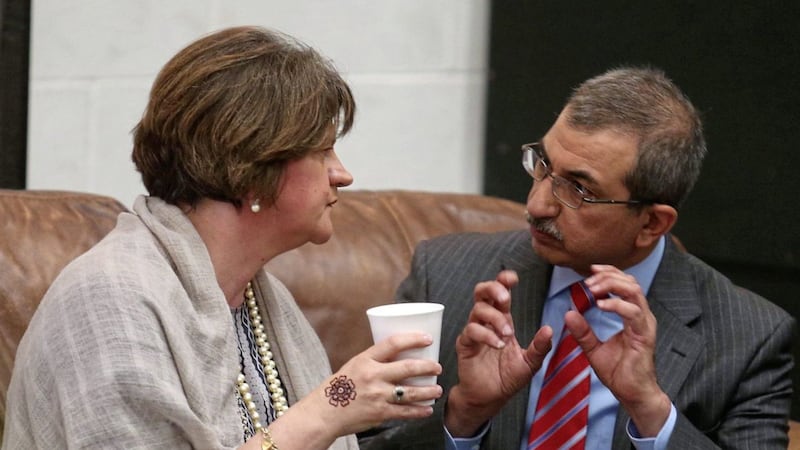Former Alliance leader Lord Alderdice has quit the Presbyterian Church in Ireland over its stance on same-sex relationships.
Of course, the great strength of Presbyterianism is that you can leave your church and only become more Presbyterian.
Lord Alderdice is now qualified to start his own congregation or even denomination, should he wish to go full Paisley in his golden years. It is no coincidence that the dissenting faith is associated with the early years of Irish republicanism. In both movements, the first item on the agenda is the split.
What splits much of the DUP off from mainstream Presbyterianism is evangelicalism, of which the defining characteristic is the need to be born again.
The party’s present leader, Arlene Foster, comes from a classic Church of Ireland background that could not be more different.
Does this explain why something seems lacking in her current rebirth, as she embarks on a charm offensive with GAA fans, Irish speakers, LGBT groups and minority faiths?
The Anglican/dissenting divide is part of the deep fault line in the Ulster Protestant population, also running to various degrees between the middle class and the working class, the UUP and the DUP, the Ulster-Scots and the Ulster-English and east and west of the Bann. Foster is rooted in Fermanagh, an English plantation county - the first unionist leader from that background in 40 years and the first DUP leader from any background like it.
A neat over-analysis of this divide is easy to fall into but there is something in it that creates a specific difficulty for Foster in selling herself as a changed person.
The problem is not a lack of sincerity. To an extent, the more awkward she looks holding a Fermanagh GAA top in her red, white and blue suit, the more genuine her inner struggle appears. Nor are selfish political motives an issue - those are valid motivations for any politician.
What is missing is an evangelical’s pride in the personal epiphany, which came so abruptly and emotionally from her DUP predecessors.
Consider Peter Robinson’s speech two weeks ago on preparing for a united Ireland, or his humble redemption - for a while - after his family crisis in 2010.
Recall Ian Paisley’s near tearful meetings with Taoiseach Bertie Ahern after the St Andrews agreement, when he declared himself a proud Irishman with no need for the English telling him what to do. Paisley’s family remains close to Ahern to this day.
To be born again is a permanently lived sacrament, conveyed by regular and ritual professions, the more repentant and sentimental the better.
Many evangelical congregations expect a first rebirth in your early teens, treating it like a bar mitzvah or first confession.
I am the same age and from the same background as Foster. As a teenager in the 1980s I witnessed several of my contemporaries declaring themselves born again from the lectern and found the ceremony excruciatingly embarrassing - a contrived public unburdening, dripping with false modesty. It felt alien and bizarre, its only cultural equivalent the US televangelism much mocked at the time. Yet in a way, it was the future. Within a couple of years, reality television began making a secular equivalent of these testimonials the touchstone of popular culture. Within a decade, it was the bourgeois reserve of my upbringing that was considered unhealthy and outdated.
This modern spirit of lurid salvation has fed back into evangelical churches, large and small. Across Northern Ireland, pastors show off reformed loyalists and drug dealers like an Anglican minister welcoming the local gentry to the front pew. Certificate 18 confessions are as box office as an assignation on Love Island.
When Foster became leader of the DUP there was a widespread assumption she would be a liberalising influence, at least on social policy, over a party still dominated by Free Presbyterians.
While clearly no fundamentalist, she is trusted by DUP members of all denominations - years of glad-handing around gospel halls saw to that.
But now profound change is required, Foster remains too unlike the rest of her party to bring it along, leaving her with the challenge of changing herself.
Is further tentative liberalism in that regard enough, or a change at all?
Most of Foster’s political opponents think she should show some contrition for her role in Stormont’s collapse. Many DUP members and supporters would respond positively to this too, if it was done in way they respected. Somehow, to save herself, Foster must be born again.
newton@irishnews.com









